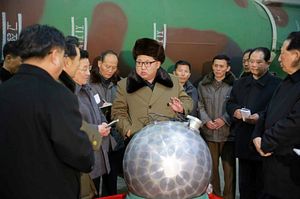A week ago, North Korea’s foreign ministry released an unusual memorandum that was disseminated through state media in English. I’ve cleaned up and posted a version here (PDF) and North Korea watcher Adam Cathcart has a helpful annotated version of the memo here. Reading the memo, there’s a sense that this is North Korea’s farewell message to the Obama administration and — what it hopes — will be the U.S. status quo policy of “strategic patience” toward North Korea, which still presumes that complete, verifiable, and irreversible disarmament (CVID) of the regime in Pyongyang is attainable at the end of the tunnel.
The memo will, in some sense, be useful as a catalog of the events that North Korea considers significant milestones in U.S. policy toward it over the last four years. It records “U.S. political acts of hostility against the DPRK,” starting in March 2012 — roughly after the failure of the so-called “Leap Day” deal, which was short-lived. (I revisited that agreement here on leap day 2016 for The Diplomat.)
Close readers of North Korean statements may take interest in Pyongyang’s casting of “strategic patience” as “strategic suffocation” instead — suffocation, of course, implying that the existing U.S. policy, with Chinese and international backing, of punitive sanctions is having the desired effect of causing the regime pain and discomfort. (The UN Security Council, meanwhile, will meet on November 30 to vote on a new round of sanctions in response to the September 9 fifth nuclear test, per reports.)
The memo is a send-off document to the Obama administration, but North Korea is clearly also setting out its bottom line for the incoming administration of President-elect Donald Trump: ‘We’re here, we’re nuclear, get used to it.’ The concluding paragraph captures this position, which isn’t new and will be familiar to North Korea watchers who’ve kept an eye on DPRK statements following the two most recent nuclear tests:
The DPRK has chosen the road of possessing nuclear weapons as a self-defensive measure to safeguard its state and system from the constant nuclear threat of the U.S. We are strengthening our nuclear forces both in quality and quantity, holding fast to the line of simultaneously developing the national economy and nuclear forces as our strategic line. The U.S. should face up to the new strategic position of the DPRK and take actual measures to show that they are willing to scrap its anachronistic hostile policy and nuclear threat against the DPRK.
The memo additionally concludes:
…the root cause of escalated tension on the Korean peninsula lies with the U.S. hostile policy and nuclear threats against the DPRK, not the latter’s nuclear and missile tests.
North Korea being a relative black box, it’s impossible to precisely determine the reasoning behind the release of such a memo, but Pyongyang may sense an opportunity. The incoming Trump administration may be open to a degree of heterodoxy in foreign policy that could translate to opportunity; indeed, Trump has expressed a willingness to talk one-on-one with Kim Jong-un.
Even if the two leaders are unlikely to meet face-to-face (Kim has yet to meet in person with an external head-of-state), North Korea may sense an opportunity to finally realize its long-sought goal of direct diplomacy with the United States without preconditions. Moreover, Pyongyang may sense that the Obama administration’s hesitation to engage directly with North Korea at the risk of legitimizing its status as a nuclear state will be less important to the Trump administration.
Diplomatic engagement, for North Korea, is certainly more preferable to the status quo of punitive economic sanctions while the U.S.-South Korea alliance continues to talk more explicitly than ever about the possibility of preemptive decapitation attacks, taking out the regime. As John Delury told NKNews, “It’s almost like they wrote a policy review for the Trump team and said ‘Here’s our take on it.’”
We still don’t have a clear sense of where the Trump administration will end up going with North Korea policy, but odds are that for the first few months post-inauguration, we’ll see a continuation of Obama’s policy. An important litmus test of the new administration’s appetite for change will be its reaction to the next inevitable North Korean ballistic missile test.
Even with Trump’s potential openness to exploring a return to talks with North Korea with no or more realistic preconditions, there’s little to suggest that the U.S. president-elect or his top advisers would recommend any action that would concede U.S. recognition of North Korea as a nuclear state, as Pyongyang so desperately desires.
Given Trump’s unusual fixation on running his political operation out of Trump Tower in midtown Manhattan, one area to watch will be the possible reactivation of the so-called “New York channel” between senior U.S. officials and North Korean representatives who travel to New York for UN meetings, including the General Assembly. (Pyongyang killed the channel after the United States, for the first time ever, named Kim Jong-un in sanctions.)
To the contrary, the administration’s willingness to pursue a more hardline policy against China — perhaps even linking U.S. economic contact with Beijing to security concerns — could make matters worse for North Korea, potentially further destabilizing the Korean peninsula in the process and causing a repeat of the violence seen in 2010, when the North sank the ROKS Cheonan and shelled Yeonpyeongdo.
In the meantime, watch for North Korea’s next provocative missile test, which may well be timed to Trump’s January 20 inauguration. (North Korea has shown an appreciation for timing its launches with the U.S. political calendar recently, having staged a Hwasong-10 test as the third U.S. presidential debate kicked off.) One wonders if the president-elect, who has chosen to sit out intelligence briefings at a much higher rate than his predecessors, even knows about the North Korean memo.

































